Greater productivity, resilience, and well-being at the 2025 World Economic Forum.
Disclaimer: We thank Prof. Njamnshi and his co-authors for this report and detailed plans for future directions. This article represents the opinions of the authors and does not represent an official report of the WFN.
By Alfred K. Njamnshi, Harris A. Eyre, Zul Merali, Frédéric Destrebecq, Kristina Adorjan, and Claudio L. A. Bassetti
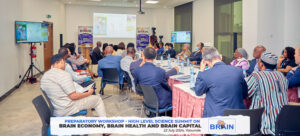
The launch of the Yaoundé Declaration on World Brain Day 2024 by SCAN, BRAIN, and the Technical Scientific Committee.
It has taken some time, but we have finally recognized that the brain is not only the most vital organ in the body — since anencephaly is incompatible with life — but that it is the seat of who we are as humans. What we do, feel, believe, aspire, and hope for, including a better socio-economic paradigm, is governed by the brain. Indeed, our brains carry the footprint of our past, present, and future, defining both our heritage and our legacy.
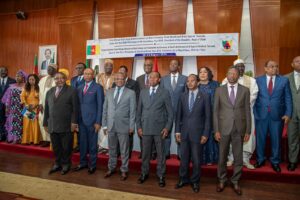
The officiating personalities with some members of the Cameroon government present at the endorsement ceremony for the Yaoundé Declaration.
Since the inaugural World Brain Day (WBD) on July 22, 2014, the World Federation of Neurology (WFN) has been celebrating the brain each year to raise global awareness about its vital importance.1 The celebration of WBD has been expanded in some parts of the world to a full week of activities focused on the brain. Brain Week in Cameroon and Africa (BWCA)2,3 by the Society of Cameroonian Neurologists (SCAN) and Brain Research Africa Initiative (BRAIN) is one example.
As part of the BWCA, the first “African high-level science summit on the brain economy, brain health, and brain capital” was organized on July 22 and Aug. 22, 2024, and the resulting Yaoundé Declaration on the brain economy, brain health, and brain capital was launched on World Brain Day 2024. The deliberate choice of this date for this official launch was to align with the vision of the WFN to further celebrate the brain and mobilize more stakeholders and partners around the world to do the same. The Yaoundé Declaration, the Swiss Brain Plan, and other regional and national initiatives have since been discussed at multiple meetings. These include:
- The United Nations General Assembly Science Summit Brain Days (2024)
- The European Union Parliament (2024)
- The preparatory workshop for the G7 Summit to take place in Canada in June of this year
- The 2025 World Economic Forum in Davos, Switzerland4,5,6,7
The World Economic Forum (WEF) is held annually in Davos, Switzerland, with a mission to “bring together government, businesses, and civil society to improve the state of the world.” One of the standout innovations of the WEF this year was the launch of the Brain House, a groundbreaking concept introduced by the Davos Alzheimer’s Collaborative (DAC), under the leadership of George Vrandenburg.
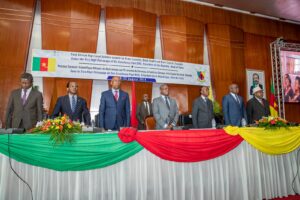
The endorsement of the Yaoundé Declaration by the Cameroon Government on Aug. 22, 2024 (left to right): Messi Atangana Luc, mayor of Yaoundé City, Prof. A.K. Njamnshi, Naseri Paul Bea, governor of the Center Region of Cameroon, Prime Minister Dr. Joseph Dion Ngute, Prof. J. Fame Ndongo, minister of higher education, Prof. R.M. Etoua, rector, Yaoundé I University, and Prof. S.B. Chumbow, president of the Cameroon Academy of Sciences.
As to the connection between our brains and economic growth, health, and well-being, the DAC report states:
“At this year’s Davos gathering, DAC introduced the first-ever Brain House to spotlight the vital link between brain health and global challenges. Kicking off with an inspiring reception Monday evening, the event continued Tuesday with two standing-room-only panels on Life course and Investment…The history of economic growth is defined by breakthroughs that led to previously unimaginable productivity. From the steam engine that kicked off the Industrial Revolution to the transformation AI is driving today, key breakthroughs are constantly reshaping our world. We believe the next key breakthrough isn’t a tool, process, or technology. We believe it already exists in all of us — our brains. We believe by better understanding our brains, and by extension our motivations, needs, and natures, we’ll unlock the next great breakthrough. The Brain House exists to expand this pursuit beyond the halls of academia and medicine and center it in the world of capital markets and innovation needed to create a healthier, more resilient, and a more productive future.”
With this background, it is easy to understand why a Forbes article captured the spirit of Davos 2025 in these words: “Brain Health Emerges as Top Priority at Davos.” In the next paragraphs, we will attempt to summarize the main themes and highlights of the three-day experience at the Brain House in Davos WEF 2025. We will hopefully convey the urgent need for neurologists to engage and connect with other stakeholders, as we all seek “to foster neurology and brain health worldwide,” according to the WFN mission statement.
Day One
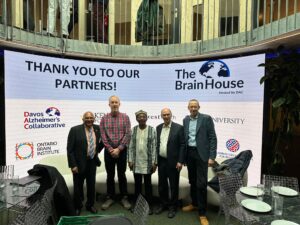
Participants at DAC Brain House launch at 2025 World Economic Forum in Davos, Switzerland. (Left to right): Prof. Zul Merali of the Brain & Mind Institute, Dr. Harris Eyre of the Brain Capital Alliance, Prof. Alfred K. Njamnshi, Prof. Morris Freedman, WFN representative, and Dr. Frederic Destrebecq of the European Brain Council.
One of the major highlights of day one of the DAC Brain House on Jan. 21, was the keynote speech written by Dr. Tedros Adhanom Ghebreyesus, World Health Organization (WHO) director general, and delivered by Dr. Catharina Boehme, WHO assistant director general:
“…prioritizing brain health for ourselves, for our families, and our communities across the life course, we can build a healthier, more resilient society for generations to come…Investing in brain health is critical to individual well-being as well as to the sustainable development of all humans…our one brain is the source of creativity, resilience, and human relationships.”
This speech opened the panel presentation and discussion titled “A Life Course Approach to Brain Health for the Future.” This perspective from a major WFN partner organization, especially given the recent adoption of the WHO Intersectoral Global Action Plan (IGAP), aligns with the WFN mission.
The second panel discussion of the day focused on “Fueling Brain Health: The Innovation and Investment Imperative.” It became evident that the brain health sector has not only emerged as a critical area for innovation, it is being recognized as a major sector for investments aimed at better productivity and well-being. This recognition will continue if current challenges are addressed.
Day Two
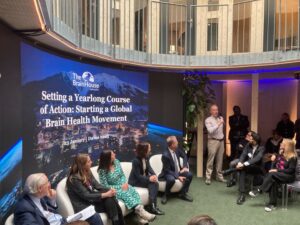
(Left to right): George Vradenburg, Lucy Pérez, Cara Altimus, Christa Studzinski, Claudio Bassetti, and Harris Eyre.
On day two, Jan. 22, the panel discussions focused on two themes.
The first panel was titled “Unlocking Global South Potential: Building Economic Resilience Through Brain Health.” The panelists represented esteemed organizations such as the WHO Foundation, Institute for Health Metrics and Evaluation, Wellcome Trust, and the Aga Khan University Brain and Mind Institute. They shared their insights on the future of brain health in the Global South, with a particular focus on Africa.
Africa is innovating in cheap, effective, and scalable solutions to brain health problems. One such solution is the Friendship Bench — a community-driven approach to mental health care originally developed and scientifically tested in Zimbabwe. This approach has been adapted by several countries around the world, including the Jordan, Kenya, Malawi, United States, Vietnam, and Zanzibar.
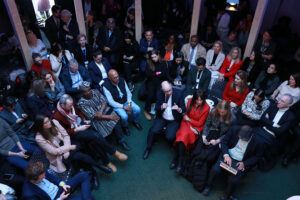
The audience for “A Life-Course Approach to Brain Health for the Future.”
Zul Merali presented the concept of “brainectome” as a consortium to address brain health issues across Africa. Prof. Alfred K. Njamnshi emphasized that the upcoming G20 Summit in South Africa later this year would provide an excellent opportunity for the summit leaders to be convinced to buy into and invest in brain health for the socio-economic development and well-being of Africa and the Global South in general. This would bring the region into alignment with the Yaoundé Declaration.
The issue of brain drain from the Global South was also discussed in the context of a new brain economy, which should be more brain positive, ensuring more diversity and less disparity. One favorite quote of the day by Byron Bitanihirwe from the Science for Africa Foundation was, “True progress lies in the Global North learning from the Global South’s experiences and innovations.”
In the second panel discussion of the day, “Brain Resilience Strategies that Address Emerging Global Challenges,” there was a lot to learn from experts in venture capital, neuroscience, neurotechnology, and academia. There was encouraging news about venture capital mechanisms and state governments investing significantly in university institutions in Houston and Rice (U.S.) for the development of neuroscience, neurotechnologies, and neuropolicies. These are expected to address the emerging global challenges and promote brain resilience.
Day Three
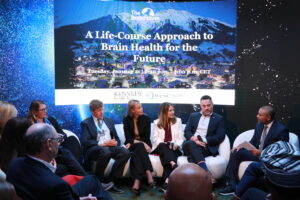
Panelists at the session titled “A Life-Course Approach to Brain Health for the Future.”
The third and last day, Jan. 23, was devoted to two conversations. The first was titled, “Brain Capital: Unlocking Workforce Resilience and Long-Term Economic Growth.”
Brain capital, simply put, is brain health plus brain skills. Some have qualified these as “soft” skills, including creativity, adaptability, emotional intelligence, and analytical and systems thinking.
The Brain Capital Dashboard defines it as: “a complex and productive stock composed of multidimensional factors that accumulate over the lifecycle. We consider brain capital as a multidimensional set of factors varying from physical to socio-cultural ones, enabling the brain to remain healthy, to develop, and to avoid deterioration.” It identifies key drivers of brain health (i.e. neurological and mental health), including food and nutritional security, lack of parental health care and general health services, the natural and cultural environments, and education.

Panelists at the session titled “Brain Resilience Strategies That Address Emerging Global Challenges.” (Left to right): George Vradenburg, Lucy Pérez, Cara Altimus, Christa Studzinski, and Claudio Bassetti.
The conversations on this theme at the Brain House focused on how employers and organizations can prioritize brain health and provide a workplace environment and culture that promotes brain health and the development of brain skills. That environment will, in turn, lead to better productivity while mitigating work-related stress, burnout, and depression. In that respect, lessons from the COVID-19 pandemic should not be forgotten or ignored.
This approach of unlocking work-force resilience and providing a brain-healthy environment for employers to continue to sharpen their brain capital would result in long-term economic growth and greater well-being. We have proposed ways of understanding the economy through neuroscience and how to transit into a more brain-healthy economy and build brain capital.7,8,9,10
The final event of the historical week was a vibrant roundtable, “Setting a Yearlong Course of Action,” moderated by George Vradenburg with interventions from Lucy Pérez, senior partner at McKinsey, Christa Studzinski of the Ontario Brain Institute, Caral Altimus of the Milken Institute, and Claudio Bassetti of the Swiss Brain Health Plan and the European Brain Council.
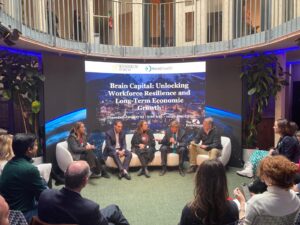
Panelists for the session titled “Brain Capital: Unlocking Workforce Resilience and Long-Term Economic Growth.” (Left to Right): Lucy Pérez, Tim Lash, Sheri Bronstein, Patrick Kennedy, and Steve Clemons.
The participants discussed the key actions necessary in the next 12 months to accelerate the ascension of the brain health agenda into major global conversations. These include the G7 in Canada (June 2025) and G20 Summit in South Africa later this year.
The following statements illustrate the ambiance of the day and indeed of the whole experience of the Brain House at Davos 2025:
- Lucy Pérez, McKinsey Health Institute: “Public private partnerships are the key to aligning on our collective aspiration and driving systems change.”
- Claudio Bassetti, EBC-vice president and chair of the Swiss Brain Health Plan: “One brain, one life, one approach: We need to join forces to make brain matters a public health priorities.”
- Amy Kennedy, The Kennedy Forum: “Businesses introduced STEM into schools by highlighting the skills they needed. Now, it’s time for businesses to tell the education system that we need to invest in developing brain skills from an early age.”
- Andy Moose, World Economic Forum: “Collaborative innovation is the theme this year and coming together physically and virtually under this common umbrella is critical. This allows us to do the work together to catalyze funding and find solutions.”
- Sheri Bronstein, Bank of America: “Our health care costs amount to $2 billion. Every quarter, our CFO asks, ‘What are we doing about this?’ That’s why we prioritize brain health — it directly impacts our bottom line.”
In Conclusion
The three-day experience of the DAC Brain House provided everyone with a valuable opportunity to connect with business professionals, learn from their insights, and ultimately discover their genuine concern for our well-being and brain health. As neurologists, neuroscientists, and psychiatrists, we are focused on diagnosing and treating people with brain (neuropsychiatric) diseases and helping populations to have healthy brains as much as we can. We often are limited by the scarcity of resources, especially in the lower- and lower-middle income countries, and are devastated by the waste of resources in some high-income countries.
This three-day interaction with policy and lawmakers, business strategists, economic investors, communicators, innovators, academics, and civil society enabled us to understand the complexities as well as the commonalities that can be leveraged to get the brain health movement to the next gear. •
Alfred K. Njamnshi, MD, FRCP, is the World Federation of Neurology delegate for Cameroon, a member of the Society of Cameroonian Neurologists (SCAN), a convener of the 2024 Brain Research Africa Initiative (BRAIN), and serves in the Neuroscience Lab in the Faculty of Medicine & Biomedical Sciences at the University of Yaoundé I, in Cameroon. Harris A. Eyre, MBBS, PhD, is a Harry Z. Yan and Weiman Gao senior fellow in brain health and lead of the Rice University’s Baker Institute Neuropolicy Program at the Center for Health and Biosciences, a visiting senior fellow at the Wharton Neuroscience Initiative at the Wharton School, University of Pennsylvania in Philadelphia, and founder and director of Brain Capital Alliance. Zul Merali, PhD, is founding director of the Brain and Mind Institute at Aga Kan University in Nairobi, Kenya. Frédéric Destrebecq, PhD, is executive director of the European Brain Council in Brussels, Belgium. Kristina Adorjan, MD, is on the Board of Directors for the Swiss Brain Health Plan and serves on the faculty of medicine at the University of Bern, Switzerland. Claudio L. A. Bassetti, MD, is chair of the Swiss Brain Health Plan and dean of the Faculty of Medicine at the University of Bern, vice president of the European Brain Council, and past president of the European Academy of Neurology. •
References:
- https://wfneurology.org/world-brain-day-2014.
- Njamnshi AK; Migraine in Cameroon: From the Painful Truth to the Powerful Tribute. World Neurology, September 11, 2019; https://worldneurologyonline.com/article/migraine-in-cameroon-from-the-painful-truth-to-the-powerful-tribute/.
- Njamnshi AK, Ngarka L, Njamnshi WY, Ahidjo N, Chabwine JN, Hachinski V; BRAIN-SCAN Congress 1.5 Scientific Committee and Organising Secretariat. The Brain Research Africa Initiative (BRAIN). Lancet Neurol. 2023 Jun;22(6):467-468. doi: 10.1016/S1474-4422(23)00164-3. PMID: 37210092.
- Njamnshi AK, Fame Ndongo J, et al. African Leadership in Brain Diplomacy: The Yaoundé Declaration Advances the Global Brain Economy Playbook for Better Brain Health. Neuroscience 2024 https://papers.ssrn.com/sol3/papers.cfm?abstract_id=5018989.
- Bassetti CLA, Heldner MR, Adorjan K, et al. The Swiss Brain Health Plan 2023-2033. Clin Translat Neurosci 2023; 7: 38: https://doi.org/10.3390/ctn7040038.
- Bègue I, Flauhaut A, Bolon I, Vicedo A.M., Bassetti CLA. One brian, one mind, one helath, one planet: A call from Switzerland for a systemic approach in brain health research, policy and practice. Lancet Public Health 2025; 50: 101229.
- Harris A. Eyre, Jennie Z. Young, Julian Karaguesian, Alfred Njamnshi, et al. The Brain Advantage for a Thriving Economy: A Global Call to Action. https://sciencepolicy.ca/posts/the-brain-advantage-for-a-thriving-economy-a-global-call-to-action/ (Preparatory Workshop to the G7 Summit in June 2025).
- Eyre HA, Hynes W, Ayadi R, Swieboda P, Berk M, Ibanez A, Castelló ME, Jeste DV, Tempest M, Abdullah JM, O’Brien K, Carnevale S, Njamnshi AK, Martino M, Mannix D, Maestri K, Yu R, Chen S, Ng CH, Volmink HC, Ahuja R, Destrebecq F, Vradenburg G, Schmied A, Manes F, Platt ML. The Brain Economy: Advancing Brain Science to Better Understand the Modern Economy. Malays J Med Sci. 2024 Feb;31(1):1-13. doi: 10.21315/mjms2024.31.1.1. Epub 2024 Jan 15. PMID: 38456111; PMCID: PMC10917588.
- Olivia Nail-Beatty, Agustin Ibanez, Rym Ayadi, Pawel Swieboda, Alfred K. Njamnshi, Jo-An Occhipinti, et al. Eyre Brain health is essential for smooth economic transitions: toward socio-economic sustainability, productivity, and wellbeing. Brain Communications, 2024 Oct 30;6(6):fcae360. doi: 10.1093/braincomms/fcae360. PMID: 39670109; PMCID: PMC11635447, https://doi.org/10.1093/braincomms/fcae360.
- Eyre HA, Graham C, Njamnshi AK and Vradenburg G. 4 Ways to make our economy brain healthy. The Brookings Policy Paper Series; 2024 https://www.brookings.edu/articles/4-ways-to-make-our-economy-brain-healthy/.
